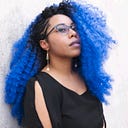45 years ago, DC Comics debuted its first Black female superhero. Here’s Why It Still Matters Today.
On December 10th, 1976, Karen Beecher became the first Black female superhero to appear in DC Comics, debuting in Volume 1, Issue #45 of Teen Titans. Karen was an engineer whose ingenuity led to her superhero status as ‘Bumblebee.’ Her origin story and character development begin her journey with a fight to be seen, heard, and trusted. She struggled, but she was brilliant, nonetheless. And isn’t this the case for so many Black women?
But Karen Beecher’s story is about much more than fandom and a comic book character. It’s about the cultural representation that Black girls and women needed to see 45 years ago — and still need today.
Art by Nigel Tully (pencils), Dan Davis (inks), and Adrienne Roy (colors)
Author/copyright owner: DC Comics.
Growing up, school teachings about Black women in history usually center enslavement, but lack meaningful discourse about liberation. Facts of the past are undoubtedly needed to better the…
